“Travel is no longer about where you stay; it’s about how you experience the world.”
This belief lies at the heart of Airbnb’s success, transforming it from a simple rental platform into a global travel ecosystem.
But many entrepreneurs still wonder: How to make an app like Airbnb? The answer lies in understanding its unique blend of user-centric design, innovative features, and a business model that adapts to evolving traveler needs.
For entrepreneurs and investors, this blog serves as a roadmap to explore opportunities, challenges, and strategies behind building a competitive Airbnb-like platform in today’s fast-moving digital landscape.
In the following guide, you’ll discover why Airbnb resonates so deeply with users, how its business model works, and a step-by-step process to create an Airbnb-like app—from features and AI integration to cost, monetization, and beyond.
Key Takeaways
The process to make an app like Airbnb requires market research, robust features, and seamless UI/UX to ensure long-term success.
AI, dynamic pricing, and predictive analytics are no longer optional but essential for delivering personalization and scalability.
Monetization models like commissions, subscriptions, and premium experiences help sustain profitability in Airbnb-like platforms.
Continuous updates, strong security, and adaptive design are critical to stand out in the competitive travel app market.
Partnering with JPLoft ensures expert guidance, innovative tech solutions, and a reliable path to bringing your Airbnb-like vision to life.
An Overview of Airbnb: Where Every Stay Becomes a Story
Airbnb has redefined the way people travel by turning simple stays into memorable experiences. What started as a modest idea to rent out extra space has grown into a trusted global platform, operating in more than 220 countries and regions.
Beyond just accommodation, Airbnb connects travelers with unique homes, boutique properties, and cultural experiences that give every trip a story of its own. It’s this community-driven approach that inspires entrepreneurs eager to create an app like Airbnb and bring similar value to their audience.
No wonder Airbnb is often listed among the best travel apps, offering flexibility and personalization that traditional hotels can’t match.
However, achieving this level of success isn’t easy. Many entrepreneurs overlook crucial details and ultimately discover why online travel apps fail, from neglecting security to ignoring user experience. By studying Airbnb’s journey, you gain insights into the process to develop an app like Airbnb with lasting impact.
Why is Airbnb Popular Among Travelers?
Airbnb didn’t just build a platform; it reshaped how people experience travel. Instead of standardized hotel stays, it offers something travelers crave: authenticity, affordability, and flexibility.
If you’ve been wondering how to create an app like Airbnb?, it’s essential to first understand why the platform resonates so deeply with millions worldwide.
This knowledge is a foundation for future-ready Airbnb app like development guide projects.
A] Personalized Stays
Airbnb lets travelers choose from diverse options; entire homes, private rooms, or shared spaces; catering to different budgets and preferences. This flexibility makes it stand out from traditional travel platforms.
Still, aspiring founders must be mindful of travel app development challenges, as offering such variety requires robust infrastructure and seamless user experience.
B] Local Experiences
From cooking classes to guided city tours, Airbnb connects users with experiences curated by locals. These immersive opportunities turn a trip into a memory, adding unmatched value to the journey.
C] Affordability and Variety
Travelers appreciate Airbnb’s cost-effective stays and wide range of listings. Whether it’s a budget apartment or a luxury villa, options abound to meet diverse travel needs.
D] Security and Trust
Airbnb invests heavily in building trust with identity verification, secure payments, and host/guest reviews. Aspiring founders can learn a lot from travel app security to build platforms that feel safe and reliable.
E] Adaptability to Market Trends
Airbnb constantly evolves with consumer expectations, whether it’s contactless check-ins or flexible cancellation policies.
Startups can’t ignore travel app development trends, as adaptability ensures survival in an ever-changing market.
Why Create an App like Airbnb?
The global travel industry is evolving at lightning speed, and digital platforms like Airbnb have reshaped how travelers book, stay, and experience destinations.
For entrepreneurs exploring the process to make an app like Airbnb, it’s important to recognize that this market isn’t just large; it’s thriving with opportunities.
If you’ve been wondering how to build an app like Airbnb?, the growing market size and user demand prove it’s one of the most profitable niches in travel tech.
Here are some stats and facts that prove why building a platform similar to Airbnb makes sense in 2025:
1. Expanding Market Size
The vacation rental market is projected to surpass $120 billion by 2030, with digital adoption being its strongest driver.
Platforms like Airbnb are proof that travelers increasingly prefer apps over traditional booking methods.
This trend is fueling interest in how to create a travel app that meets modern expectations for flexibility and personalization.
2. Millions of Active Users
Airbnb currently has more than 150 million users worldwide, generating over 400 million bookings annually.
That kind of demand demonstrates the strength of community-driven marketplaces.
Entrepreneurs planning to develop an app similar to Airbnb can leverage this user-centric model to build lasting engagement.
3. Revenue Growth and Host Benefits
Airbnb generated $10 billion+ in annual revenue in 2024, with steady growth quarter after quarter.
Beyond that, hosts collectively earn billions each year, making it attractive for both sides of the marketplace.
This shows why companies are investing in how to create an app like Omio and similar platforms to tap into this booming ecosystem.
4. Influence of Technology
The rise of AI-driven personalization, smart pricing, and seamless in-app payments has transformed the travel booking experience.
Businesses entering the market need to focus on innovation-driven Airbnb apps like development services that deliver scalable and secure platforms.
5. On-Demand Travel Expectations
Modern travelers want everything accessible instantly bookings, cancellations, payments, and local experiences.
This shift toward immediacy highlights why startups must embrace on-demand app development services to create responsive, user-first solutions that rival giants like Airbnb.
These were some of the major aspects and reasons to consider when it comes to building an app like Airbnb. Now, let’s proceed with the working procedure in the following section.
How Airbnb Works: Business Model?
Airbnb’s success lies in its unique yet simple approach: connecting travelers with hosts while taking care of the technology, trust, and transactions in between.
If you’re curious about how to build an app like Airbnb, it’s vital to understand the mechanics of its business model.
Below are the pillars that make it work:
► Two-Sided Marketplace
Airbnb acts as a bridge between travelers and hosts. Guests gain access to millions of listings worldwide, while hosts earn income by renting out their spaces.
This dual benefit is why many startups aim to make an Airbnb clone and tap into the same win-win ecosystem.
► Commission-Based Revenue
The platform generates revenue by charging a commission, usually between 3% and 15% per booking, from both hosts and guests.
This scalable model ensures that Airbnb earns regardless of property size or location, making it one of the most sustainable approaches in travel tech.
► Technology-Driven Trust
Airbnb prioritizes trust with features like verified profiles, secure payment gateways, and user reviews.
Entrepreneurs will notice that trust and security aren’t add-ons; they are central to long-term success.
► Add-On Services and Experiences
Beyond stays, Airbnb offers curated local activities and premium experiences. This diversification broadens revenue streams and enhances brand loyalty.
Competitors exploring how to make an app like Tripadvisor can learn from Airbnb’s ability to expand offerings while keeping users engaged.
► Platform as a Service
At its core, Airbnb operates as a platform, not a property owner. This asset-light model minimizes operational costs while maximizing scalability.
Startups leveraging mobile app development services can adopt this same model to reduce risks and build an Airbnb alternative focused purely on growth
► Easy Accessibility
The entire platform is built to be a simple search, filter, book, and pay within minutes.
Entrepreneurs wanting to create an app that matches Airbnb’s ease of use should focus on intuitive UI/UX and frictionless user journeys.
Features to Include in Airbnb
When thinking about how to build an app like Airbnb?, the first thing that comes to mind is its feature set. Airbnb succeeds because it balances simplicity for users with powerful tools for hosts.
For entrepreneurs and startups exploring Airbnb app like development, here are the core features you’ll need to consider.
1. User-Friendly Onboarding
A seamless sign-up process via email, phone, or social media is crucial. Users should be able to create profiles, set preferences, and verify identity quickly. This is one of the top travel app features that ensures users feel comfortable from the first tap.
2. Advanced Search & Filters
Travelers love choice, but they value control even more. Detailed filters, such as price range, property type, amenities, and cancellation policies, allow users to find exactly what they want. Startups analyzing how to develop an app like Kayak can see how search precision builds loyalty.
3. Real-Time Booking & Payments
Instant booking and integrated payment gateways provide frictionless experiences. Features like secure checkout, multiple payment options, and cancellation flexibility are essential to keep users engaged and satisfied.
4. Reviews & Ratings
Trust is the backbone of Airbnb. Guest and host reviews create transparency, helping future users make informed decisions. When planning to create an app like Airbnb, don’t skip this feature; it’s critical for credibility and user retention.
5. Host Dashboard & Management Tools
Hosts need features to manage listings, set availability, adjust pricing, and track earnings. A clean dashboard ensures smooth operations and reduces reliance on third-party tools.
6. Push Notifications & Messaging
Travelers expect timely updates whether about booking confirmations, check-in details, or promotions. Direct messaging between hosts and guests adds an extra layer of trust and convenience.
7. Scalability & Technology Backbone
Behind the scenes, the mobile app tech stack plays a key role in ensuring performance and scalability. From database handling to API integrations, a robust architecture makes sure the app runs smoothly even with millions of users.
8. Intuitive UI/UX
Finally, design makes or breaks the experience. Prioritizing a clean interface, smooth navigation, and minimal clicks is a must. Businesses looking to design a mobile app should invest in intuitive layouts that elevate both trust and engagement.
Now, here is what awaits you the most: steps to build an app like Airbnb, in the following section.
How to Make an App like Airbnb?
Building a platform like Airbnb isn’t just about listing properties; it’s about creating a seamless, trustworthy, and user-friendly experience for both travelers and hosts.
Whether you’re aiming to replicate its core functionalities or innovate with new features, understanding the process to make an app like Airbnb is crucial.
This step-by-step guide to make an app like Airbnb will walk you through the entire journey, from initial planning to post-launch maintenance, ensuring your app stands out in the competitive travel tech space.
Step 1: Conduct Market Research
Before writing a single line of code, understanding your target audience and competitors is key. Market research helps identify gaps in existing solutions and uncovers opportunities for innovation.
A) Identify User Needs
Study the preferences and pain points of travelers and hosts. Surveys, focus groups, and analytics of platforms like Airbnb can provide actionable insights.
B) Analyze Competitors
Look at other travel apps, their features, pricing, and user feedback. Learning how to create an app like Hopper can inspire innovative approaches in your design.
C) Define Unique Value Proposition
Clarify what sets your app apart. Whether it’s better pricing, niche stays, or AI-powered recommendations, your USP will drive user adoption.
Step 2: Design the App
A strong UI/UX ensures users stay longer and engage more with your platform. Prioritize simplicity, accessibility, and smooth navigation.
A) Wireframes & Prototypes
The design journey begins with mobile app wireframing, which acts as a visual blueprint for each screen. It defines layout, structure, and navigation flow, helping teams align early in the process.
Once wireframes are finalized, the next step is mobile app prototyping. Prototypes provide an interactive preview of the app, allowing stakeholders to test user journeys, identify gaps, and refine the overall design before development begins.
B) Intuitive User Interface
Design a clean interface where booking, searching, and payments are effortless. Following how to design travel app principles ensures your app feels modern and professional.
C) Responsive Design
Make sure the app works seamlessly on different devices and screen sizes, enhancing accessibility and user satisfaction.
D) Branding & Visual Elements
Incorporate consistent colors, fonts, and logos that reflect your brand’s identity, fostering trust and recognition among users.
Step 3: Develop Core Features
The backbone of your Airbnb-like app is its feature set. From booking systems to host dashboards, every functionality should be intuitive and reliable.
A) User Profiles & Verification
Allow travelers and hosts to create detailed profiles with verification options. This builds trust and ensures safety on your platform.
B) Real-Time Booking & Payments
Integrate secure payment gateways for seamless transactions. Prioritize mobile app security to safeguard user data and transactions.
C) Reviews & Ratings
Enable users to provide feedback and ratings. Transparent reviews increase credibility and guide future users in decision-making.
D) Search & Filter Options
Advanced search filters, such as price range, location, amenities, and availability, make it easy for users to find ideal listings.
Step 4: Backend & Technology Stack
A robust backend and the right mobile app tech stack ensures performance, scalability, and smooth operation as your user base grows.
A) Database & Cloud Integration
Choose a scalable database and cloud infrastructure to handle large volumes of data and user activity efficiently.
B) APIs & Third-Party Integrations
Integrate maps, payment processors, and calendar tools. APIs enhance functionality while saving development time.
C) Security Protocols
Implement encryption, secure authentication, and regular audits. Protecting user data and payment information is non-negotiable.
D) Maintenance & Updates
Even after launch, continuous improvement is essential. Partner with mobile app maintenance services to ensure your app stays updated, secure, and competitive.
Step 5: Testing & Launch
Thorough testing eliminates bugs and improves user experience. Conduct beta testing with a select user group and gather feedback to refine your app.
A) Functional Testing
Ensure all features work as intended, from booking to payments, on all devices and platforms.
B) Performance Testing
Check app speed, load times, and server response to ensure smooth operations even under high traffic.
C) User Acceptance Testing
Gather real user feedback to identify areas of improvement and confirm that the app meets market expectations.
D) Launch & Marketing
Plan a strategic launch with promotions and social campaigns to attract early users and generate buzz around your platform.
Use of AI to Make an App like Airbnb
AI is redefining how travel apps function, and Airbnb has already embraced it to deliver smarter, more efficient experiences.
If you aim to develop an app like Airbnb, weaving AI into the core is no longer optional; it's essential for personalization, security, and scalability.
With the following points, let’s get to know how AI is going to leverage your Airbnb like app development with current age advancements.
1. Personalized Recommendations
AI analyzes user preferences, booking history, and browsing patterns to offer customized stays or experiences. This personalization boosts user engagement and loyalty. Leading players use AI in hospitality to create journeys that feel tailor-made for every traveler.
2. Dynamic Pricing Optimization
Smart algorithms help hosts set competitive yet profitable prices by considering demand, location, seasonality, and competition. Future-ready platforms combine this with AR in travel apps, allowing users to visualize properties virtually while pricing adapts dynamically.
3. Fraud Detection & Security
With AI, apps can detect suspicious behavior in real time and prevent fraudulent bookings. This extra layer of safety is critical when dealing with financial transactions and user data, building trust and confidence in the platform.
Businesses curious about how to build an AI travel agent can also adapt fraud detection and security features to create safer, more reliable digital assistants.
4. Smart Chatbots & Virtual Assistants
AI chatbots deliver round-the-clock support, answering queries instantly from booking help to policy clarifications. Businesses aiming to build an AI app can take inspiration from this feature to reduce costs while improving response times.
5. Predictive Analytics for Hosts
AI empowers hosts to predict demand, optimize availability, and boost occupancy. Startups often partner with AI app development services to integrate such predictive tools, giving their platform a competitive edge in the fast-changing travel market.
What’s the Cost to Develop an App like Airbnb?
The cost to develop an app like Airbnb typically ranges between $25,000 and $150,000+, depending on features, design complexity, technology stack, and developer location.
The answer to how much does it costs to develop an Airbnb clone varies, but here’s a clear breakdown to help you estimate smartly:
► MVP Development
Building a Minimum Viable Product (MVP) with essential features like user profiles, search, and booking costs between $25,000–$40,000.
This gives startups a quick market entry and real-world user feedback before scaling further. Many entrepreneurs compare this to the cost to develop a travel app when calculating budgets.
► Advanced Features & Scalability
Adding AI-based personalization, multi-language support, secure payments, and host dashboards increases the cost to develop an app like Airbnb significantly.
Expect a range of $50,000–$100,000, depending on customization. These advanced features differentiate your platform from simple clones.
► Design & User Experience
A sleek, intuitive design isn’t just about looks it impacts usability and trust. Crafting a polished UI/UX can cost anywhere from $10,000–$20,000, influenced by complexity and design standards.
This is similar to what’s seen in the cost to create an app like Agoda, where design plays a critical role in user retention.
► Region of Development
Location matters a lot. Hiring mobile app developers in Denver or Western Europe could cost $100–$150 per hour, while teams in Asia may charge $30–$60 per hour.
This global variation heavily affects the final cost to make an app like Airbnb and should be considered early in planning.
► Ongoing Maintenance
Even after launch, expenses don’t stop. Regular updates, bug fixes, and security patches can cost 15–20% of annual development costs.
A good benchmark can be drawn by looking at the cost to develop a travel app like Visit Dubai, where post-launch support forms a significant portion of the overall budget.
How an App like Airbnb Makes Money?
Airbnb’s success comes not just from its popularity but from a well-structured monetization model. If you’re exploring Airbnb app like development, here are the primary ways such platforms generate revenue:
► Commission from Bookings
Airbnb charges both hosts and guests a commission for each booking, usually between 3–15%.
This two-sided approach ensures consistent revenue, making it a proven guide to develop an app like Airbnb that sustains long-term profitability.
► Service Fees for Premium Features
Hosts can pay extra for premium visibility, verified listings, or promotional placements.
Similar strategies are highlighted in various travel app monetization strategies, showing how add-ons can boost platform income.
► Experiences & Activities
Airbnb expanded into tours, workshops, and curated local activities.
This diversification has inspired startups to broaden beyond core services and explore new revenue opportunities.
► Subscription Models
Some hosts opt for subscription plans with lower commission rates in exchange for fixed monthly fees.
This flexibility benefits high-volume hosts and creates a predictable income stream for the platform.
► Partnerships & Advertising
Airbnb also partners with local businesses for promotions and earns from in-app advertising.
Startups looking to make an Airbnb alternative often integrate ads strategically to add another revenue stream without hurting user experience.
Partner with JPLoft and Build Your App
Building the next big platform in travel requires more than just an idea; it needs the right technology partner.
At JPLoft, we specialize in creating scalable, secure, and user-friendly solutions for startups and enterprises alike.
Whether you want to create an Airbnb clone or make an Airbnb clone, our expert team can turn your vision into reality.
As a leading travel app development company, we bring deep industry expertise, a robust tech stack, and proven success in delivering apps that users love.
Partner with us today and take the first step toward developing an alternative to Airbnb that resonates with travelers.
Conclusion
The journey of figuring out how to make an app like Airbnb? shows that success relies on a clear strategy, innovative features, and user-focused design.
From ideation to launch, every step matters, whether it’s market research, app design, or choosing the right tech stack.
With the right planning, you can even develop an Airbnb clone that stands out in a highly competitive travel industry.
As travel continues to evolve, apps that prioritize trust, personalization, and seamless booking experiences will win users’ loyalty.
If you’re ready to enter this space, now is the time to innovate and bring your Airbnb-like idea to life.
Partnering with experts ensures your Airbnb like app development project moves from idea to a revenue-generating platform faster and more reliably.
FAQs
The cost to develop an Airbnb-like app depends on features, platform choice (iOS, Android, or both), UI/UX design, and region of development. On average, the range can be anywhere between $40,000 to $200,000+. A basic version will cost less, while a feature-rich, scalable solution with AI, personalization, and integrations will increase the budget.
Building an Airbnb clone can take 4 to 9 months depending on complexity. A simple MVP version with core booking features might be ready in 3–4 months, while a full-scale product with advanced features like real-time messaging, payments, and smart search filters may extend development time. Choosing an experienced team ensures faster delivery with quality.
Key features include user registration, property listing, search filters, booking and payment integration, reviews and ratings, and in-app messaging. For competitive advantage, many businesses add features like AI-based recommendations, smart maps, and 24/7 customer support. These features enhance user experience and help apps like Airbnb build trust and loyalty among travelers.
Both options have pros and cons. A ready-made solution offers a quicker launch and lower initial investment, but customization may be limited. On the other hand, developing from scratch gives you full control over design, features, scalability, and security. Most startups aiming for long-term growth prefer a custom-built Airbnb-like platform.
The tech stack typically includes React Native or Flutter for mobile apps, Node.js or Ruby on Rails for the backend, and PostgreSQL or MongoDB for databases. Cloud services like AWS or Google Cloud handle scalability. Integrating APIs for maps, payments, and notifications is also essential to deliver a smooth and reliable Airbnb-like experience.





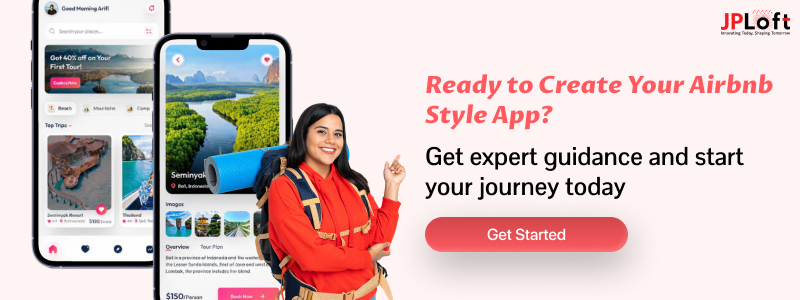
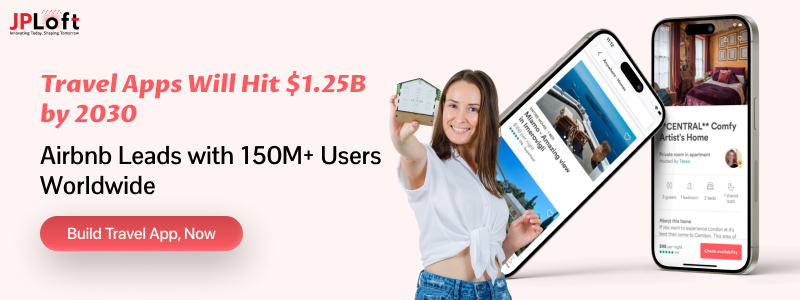

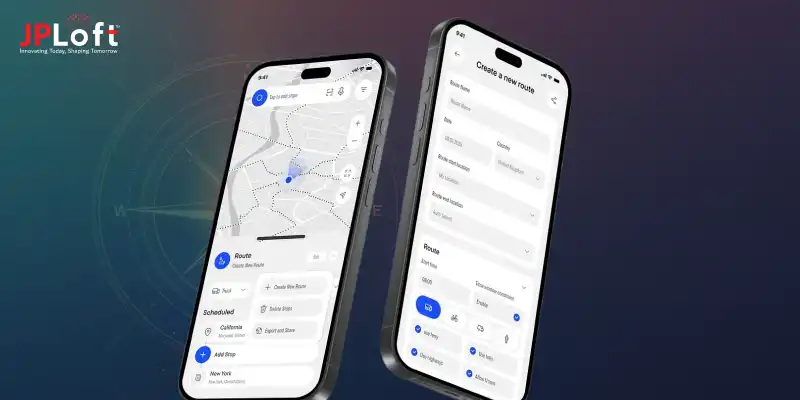
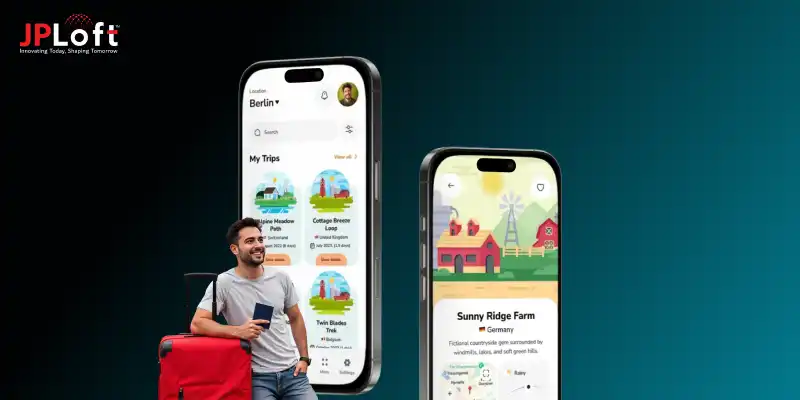
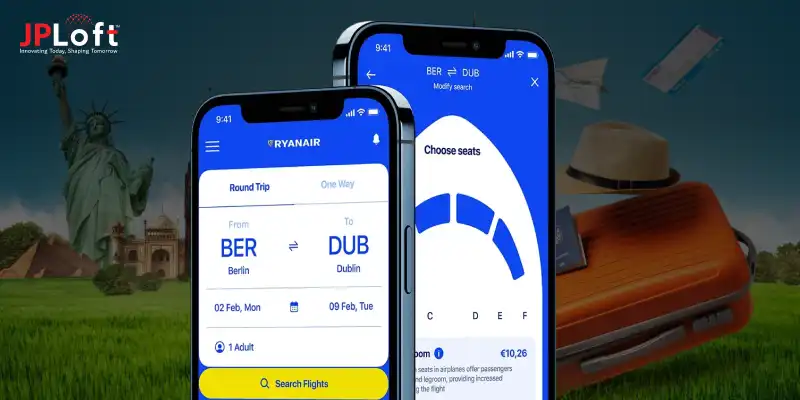


Share this blog